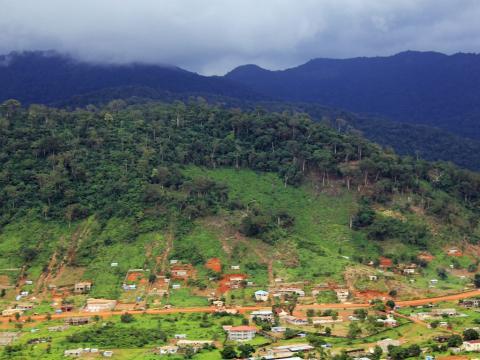By Umaru Fofana
Freetown has lost 26% of the 18,000 hectares (180 square kilometres) of the Western Area peninsula national park which provides clean water to the city’s residents.
According to a UN World Food Programme report released last week, the rest of the forest is also critically under threat due to human activities such as land grabbing, charcoal burning, quarrying and marijuana cultivation.
The latest analysis was recorded in the last seven year when the WFP started measuring it in 2016. And it shows how construction companies are depleting the forest with government approval.
The report warns that deforestation could contribute towards "slope destabilization, water shortages, landslides and floods" and calls for the close monitoring of forest coverage to protect the city's main water sources.
The report says that last year alone, the Western Area Peninsular lost parts of its forest the size of 1,038 football fields.
Minister of environment and climate change, Jiwoh Abdulai, says the situation is worrisome. "The issue of deforestation on the Western Area peninsula is tragic, worrying and alarming," he says.
He said that enforcement of the law and policies was a major challenge, adding that he was working on a new reforestation policy and that authorities regularly demolished the temporary structures that people were putting up in the national park, with a more agreeable solution being sought for permanent structures. He said the new policy they were designing would be “the boldest reforestation policy in the country”.
The minister said that they planned to stop the cutting of trees, while intensifying the planting of new ones. Temporary structures built by encroachers were being demolished while a cabinet subcommittee, he said, was considering demolishing permanent structures that had been illegally put up.
The Managing Director of the state-owned Guma Valley Water Company says the consequence is already being felt “and it is serious”.
He said that in 2023 they witnessed the briefest ever spillage of water from their dam at the peak of the rainy season in August and September.
The Western Area occupies about 18,000 hectares, which the National Protected Area Authority also says is under threat.
Freetown is a long strip of land sandwiched by the Atlantic Ocean and the mountains that overlook it. It is built on a forested peninsula mostly made up of national park land. Its water comes from reservoirs in the mountains, but deforestation is causing rain to drain off the hillsides rather than seeping through roots into the soil and streams.
Forest areas around cities in West Africa are constantly under threat as urban areas expand. This is a common phenomenon across the west Africa prompting Ivory Coast to build a concrete fence to protect the park land near its sprawling commercial capital, Abidjan.
Copyright © 2024 (Politico 31/01/24)








